
The Democratic Progressive Party (DPP) is a Taiwanese nationalist and center-left political party in Taiwan. Controlling both the Republic of China presidency and the unicameral Legislative Yuan, it is the majority ruling party and the dominant party in the Pan-Green Coalition as of 2022.
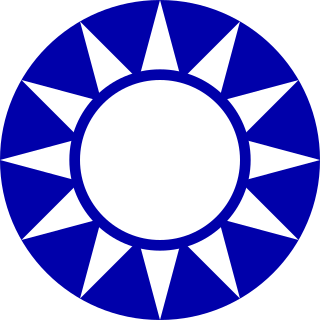
The Kuomintang (KMT), also referred to as the Guomindang (GMD) or the Chinese Nationalist Party, is a major political party in the Republic of China throughout its historical periods in both the Chinese mainland as well as Taiwan. It was the dominant ruling party of the Republic of China on the mainland from 1928 to 1949. The party was then exiled from the mainland due to its defeat in the Chinese Civil War, but retained its authoritarian rule over Taiwan under the Dang Guo system until democratic reforms were enacted in the 1990s. In Taiwanese politics, the KMT is the dominant party in the Pan-Blue Coalition and primarily competes with the rival Democratic Progressive Party (DPP), it is currently the largest opposition party in the Legislative Yuan. The current chairman is Eric Chu.

Taiwan, officially the Republic of China (ROC), is a country in East Asia. It shares maritime borders with the People's Republic of China (PRC) to the northwest, Japan to the northeast, and the Philippines to the south. The main island of Taiwan, formerly known as Formosa, has an area of 35,808 square kilometres (13,826 sq mi), with mountain ranges dominating the eastern two-thirds and plains in the western third, where its highly urbanised population is concentrated. The capital is Taipei, which, along with New Taipei and Keelung, forms the largest metropolitan area of Taiwan. Other major cities include Kaohsiung, Taichung, Tainan and Taoyuan. With 23.45 million inhabitants, Taiwan is among the most densely populated countries in the world.
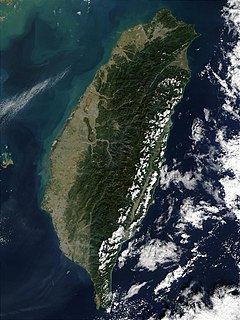
Taiwan, officially the Republic of China (ROC), is a country located in East Asia. The main island of Taiwan, known historically in Portuguese and English as Formosa, makes up 99% of the area controlled by the Republic of China, measuring 35,808 square kilometres (13,826 sq mi) and lying some 180 kilometres (112 mi) across the Taiwan Strait from the southeastern coast of mainland China. The East China Sea lies to the north of the island, the Philippine Sea to its east, the Luzon Strait directly to its south and the South China Sea to its southwest. The ROC also controls a number of smaller islands: some in the Taiwan Strait, and some of the South China Sea Islands.

The economy of Taiwan is a highly developed free-market economy. It is the 8th largest in Asia and 18th-largest in the world by purchasing power parity, allowing Taiwan to be included in the advanced economies group by the International Monetary Fund. It is gauged in the high-income economies group by the World Bank. Taiwan is the most technologically advanced computer microchip maker in the world.

Taiwan has full diplomatic relations with 13 out of 193 United Nations member states, as well as the Holy See. Historically, the ROC has required its diplomatic allies to recognise it as the sole legitimate government of "China", but since the 1990s, its policy has changed into actively seeking dual recognition with the People's Republic of China. In addition to these relations, the ROC also maintains unofficial relations with 58 UN member states, one self-declared state (Somaliland), three territories, and the European Union via its representative offices and consulates. Taiwan has the 31st largest diplomatic network in the world with 110 offices.
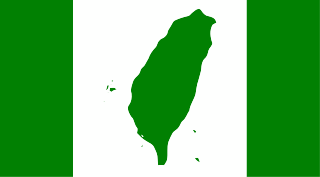
The Taiwan independence movement is a political movement which advocates the formal declaration of an independent and sovereign Taiwanese state, as opposed to the status quo of "Two Chinas" or Chinese unification.

Taiwanese indigenous peoples, Formosan people, Austronesian Taiwanese, Yuanzhumin or Gaoshan people, are the indigenous peoples of Taiwan, who number about 569,000 or 2.38% of the island's population. This total is increased to more than 800,000 people if the indigenous peoples of the plains in Taiwan are included, pending future official recognition. Recent research suggests their ancestors have been living on Taiwan for approximately 6,500 years. A wide body of evidence suggests Taiwan's indigenous people maintained regular trade networks with regional cultures before major Han (Chinese) immigration from continental Asia began in the 17th century.

Taipei, officially Taipei City, is the capital and a special municipality of the Republic of China (Taiwan). Located in Northern Taiwan, Taipei City is an enclave of the municipality of New Taipei City that sits about 25 km (16 mi) southwest of the northern port city of Keelung. Most of the city rests on the Taipei Basin, an ancient lakebed. The basin is bounded by the relatively narrow valleys of the Keelung and Xindian rivers, which join to form the Tamsui River along the city's western border.
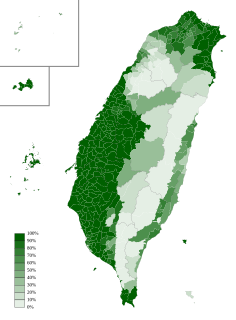
Taiwanese, also known as Taigi, Taiwanese Hokkien, Taiwanese Minnan, Hoklo and Holo, is a variety of the Hokkien language spoken natively by about 70% of the population of Taiwan. It is spoken by the Taiwanese Hoklo people, who descended from immigrants from southern Fujian during the Qing dynasty. The Pe̍h-ōe-jī (POJ) romanization is a orthography for Taiwanese.
The controversy regarding the political status of Taiwan, sometimes referred to as the Taiwan Issue or Taiwan Strait Issue or, from a Taiwanese perspective, as the Mainland Issue, is a result of the Chinese Civil War and the subsequent split of China into the two present-day self-governing entities of the People's Republic of China and the Republic of China.
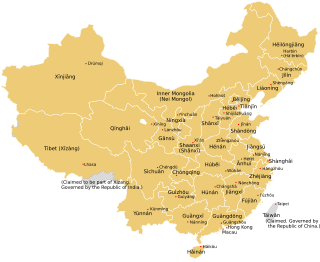
The provincial level administrative divisions are the highest-level administrative divisions of China. There are 34 such divisions claimed by the People's Republic of China, classified as 23 provinces, five autonomous regions, four municipalities and two special administrative regions. The political status of Taiwan Province along with a small fraction of Fujian Province remain in dispute, those are under separate rule by the Republic of China, which is usually referred to as "Taiwan".

"Chinese Taipei" is a designated term being used in various international organizations and tournaments for the representation of the Republic of China (ROC), a sovereign state commonly known as Taiwan.

The Chinese people or simply Chinese, are people or ethnic groups identified with China, usually through ethnicity, nationality, citizenship, or other affiliation.

Tsai Ing-wen is a Taiwanese politician and academic serving as the President of the Republic of China (Taiwan) since 2016. A member of the Democratic Progressive Party (DPP), Tsai is the first female president of Taiwan. She has served as Chair of the DPP since 2020, and previously from 2008 to 2012 and 2014 to 2018.
Taiwanese people may be generally considered the people of Taiwan who share a common culture, ancestry and speak Taiwanese Mandarin, Hokkien, Hakka or indigenous Taiwanese languages as a mother tongue. Taiwanese people may also refer to the indigenous peoples of the areas under the control of the Government of the Republic of China since 1945, including Penghu, Kinmen and Matsu Islands.

The island of Taiwan, together with the Penghu Islands, became a dependency of Japan in 1895, when the Qing dynasty ceded Taiwan Prefecture in the Treaty of Shimonoseki after the Japanese victory in the First Sino-Japanese War. The short-lived Republic of Formosa resistance movement was suppressed by Japanese troops and quickly defeated in the Capitulation of Tainan, ending organized resistance to Japanese occupation and inaugurating five decades of Japanese rule over Taiwan. Its administrative capital was in Taihoku (Taipei) led by the Governor-General of Taiwan.

Alampla is a genus of moths in the family Immidae.
Alampla palaeodes is a moth in the family Immidae. It was described by Edward Meyrick in 1914. It is found in Taiwan and Guangdong, China.

The COVID-19 pandemic in Taiwan is part of the worldwide pandemic of coronavirus disease 2019 caused by severe acute respiratory syndrome coronavirus 2. As of 12 January 2022, 9,605,874 tests had been conducted in Taiwan, of which 17,559 are confirmed cases, including 850 deaths.

















